 Photo: Vivian Klotz Photo: Vivian Klotz Our First Bilingual Blog Post for Our First Bilingual Workshops Nuestro Primer Aporte de Blog Bilingüe Para Nuestros Primeros Talleres Bilingües By: Sarah Stearns Acabo de concluir una serie de talleres en la dramaturgia bilingüe con Mighty Writers El Futuro, un nuevo sitio bilingüe en el Italian Market. Traje actores profesionales a la fin-de-año celebración de Mighty Writers donde dieron vida a un grupo de monólogos locos, chiflados, y chistosos con compromiso admirable. Mirar las caras de los estudiantes cuando se presentaban sus obras fue precioso. La mayoría de los estudiantes querrían compartir sus obras anónimamente, un deseo que no es raro para artistas jóvenes compartiendo sus obras públicamente por primera vez en nuestras programas. Habían muchas risitas nerviosas y sonrisas pequeñas de orgullo que mostraban la alegría que los estudiantes tenían en expresarse.  Photo: Vivian Klotz Photo: Vivian Klotz Empecé la serie esperando trabajar con temas de comunidad, identidad, y lenguaje en relación al bilingüismo. Los estudiantes querrían escribir sobre volcanes, una chinchilla que habla, y lo que pasaría si se confundiera su daschund con un hot dog. Al principio estaba frustrada. ¿Cómo puedo hacerles explorar temas más serios? me pregunté. Pero para ellos, eso era la identidad, la comunidad, y el lenguaje que ellos perciben en la vida. Mighty Writers hace un muy buen trabajo de discutir el asunto de ser bilingüe sin prescribir como lo debe parecer. Como estoy redondeando mi aprendizaje con Philadelphia Young Playwrights, estoy intentando de infundir esta habilidad en mi propia pedagogía. En el primer taller, les pedí traducir un monólogo existente que anteriormente había ganado nuestra festival Young Voices. Les reté poner el monólogo parcialmente en español y parcialmente en inglés. Hicieron esta tarea fácilmente. Cuando escribíamos monólogos juntos en un grupo, les pregunté “¿podrías decir esta línea en español?” Algunas veces, la respuesta fue “no,” pero eso fue todo el permiso que necesitaban para mezclar idiomas en sus escritos individuales. Más que yo, más que cualquier instructor, estos estudiantes son expertos en vivir con dos idiomas. Lo que nosotros les podemos dar, a través de escribir obras de teatro, es el permiso a dar esta experiencia de una vida bilingue validez a través de escribir y crear arte. En el fin, si la chinchilla que habla, habla en dos idiomas en una manera que es sincera a la experiencia de los estudiantes, estoy contenta que le dábamos a esta chinchilla una voz. I just finished a series of workshops in bilingual playwriting with Mighty Writers El Futuro, Mighty Writer’s new bilingual location in the Italian Market. I brought professional actors to the end-of-the-year celebration at Mighty Writers, where they gave the students’ absurd, silly, and zany monologues life with admirable commitment. To watch the faces of the students as their monologues were presented was priceless. , The majority of students wanted to present their pieces anonymously, which isn’t uncommon for young artists sharing out their work publicly for the first time in many of our residencies. There were nervous giggles and proud little smiles that revealed the joy the students found in expressing themselves. I began the series hoping to work with themes of identity, community, and language in relation to bilingualism. The students wanted to write about volcanos, a talking chinchilla, and what would happen if one confused one’s dachshund with a hot dog. At first, I was frustrated. “How can I make them write about more serious topics?” I wondered. But for them, this was the identity, the community, and the language that they experience in their lives. Mighty Writers does an excellent job of discussing what it means to be bilingual without prescribing what that should look like. As I wrap up my apprenticeship at Philly Young Playwrights, I’m striving to infuse that skill into my own teaching. At the first workshop, I asked the students to translate an existing, previously winning monologue from our Young Voices Festival. I challenged them to set the piece bilingually, partially in Spanish and partially in English. They did so easily. When we wrote monologues together as a group, I’d ask them “can we say this line in Spanish?” Sometimes the answer was “no,” but this was all the permission they needed to mix languages in their individual writing. More than me, more than any teacher, these students are experts in living with two languages. What we can give them through play and monologue writing, is the permission to give their bilingual life experience validity through writing and artmaking. In the end, if the talking chinchilla talks in two languages in a way that is truthful to the experiences of the students, then I’m glad we gave that chinchilla a voice.
0 Comments
Leave a Reply. |
Categories
All
|
|
This work is licensed under a Creative Commons Attribution-NonCommercial-ShareAlike 2.0 Generic License.
|
|
© Philadelphia Young Playwrights - 1219 Vine Street, Floor 2 Philadelphia, PA 19107
Phone: 215-665-9226 Fax: 215-665-9228 Email: [email protected] |


